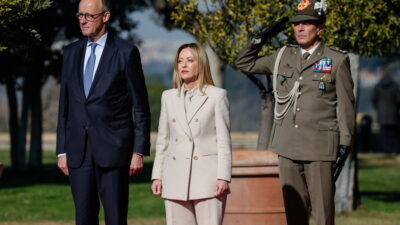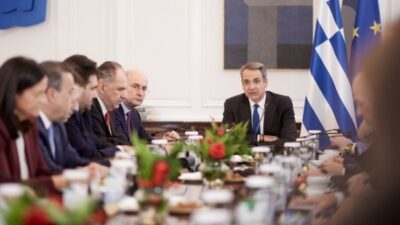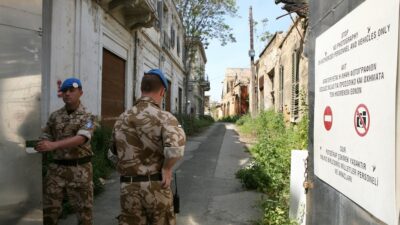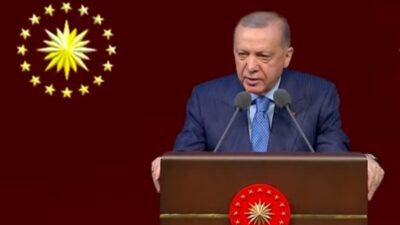Nefeli Lygerou: Hagia Sophia, the “conquest”, and ιdeological religious war
27/07/2020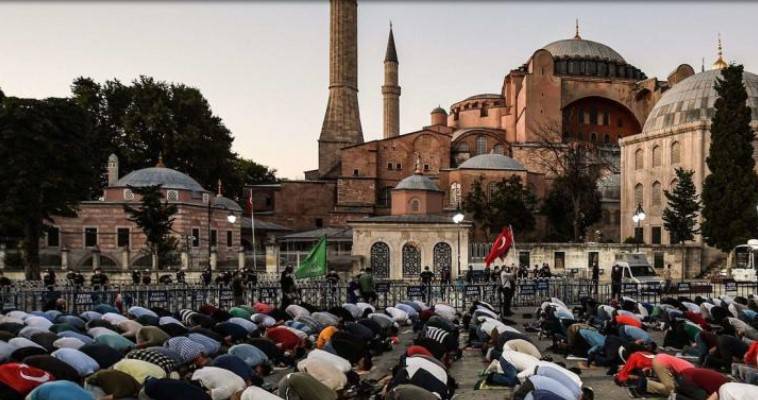
Like some other “conqueror”, Tayyip Erdogan sealed with his presence the first Muslim ceremony in Hagia Sophia after 86 whole years. Only 14 days, after the green light was given by the Turkish Supreme Court to turn the museum into a mosque. The whole prayer lasted two and a half whole hours, with the undisputed protagonist being the Turkish president himself, in a show worthy of his new Ottoman visions, which referred to a well-made performance.
Its culmination was the recitation of the Koran by Erdogan himself, wearing the characteristic white cap (taqiyah) on his head, while his visit to the tomb of Muhammad the Conqueror was not lacking. The “sultan” completed his separation from the legacy of Mustafa Kemal, declaring himself the successor of Muhammad.
The whole process was intensely propagandistic, with the aim of promoting the Turkish president as the leader of all Muslims everywhere, the one who returns to the faithful a historical monument, the result of conquest. The concept of conquest was pervasive in the sermon that followed and in the symbols chosen. For those in doubt, the supreme imam, Ali Erbas, addressed the faithful from the pulpit holding the Ottoman sword and preaching hatred.
According to Ottoman tradition, the sword held in the right hand, as was done in this case, symbolizes all that cause fear in the enemy. The imam spoke about the fulfillment of the dream of conquering Hagia Sophia. “The longing of our nation that had become a deep wound is ending. The doors of the Hagia Sophia mosque as in the other mosques of the country will be open to all the servants of Allah. “Those who defile fundamental goods and values are cursed.”
Elsewhere he said: “We have both war and peace. You choose which of the two you want “. In the end he waved his sword in the air, screaming: “whoever dares to touch this building, will burn”! Prominent were the green banners placed inside the temple, which symbolize the conquest of the city by the Ottomans, while the three white crescents emblazoned on them represent Europe, Asia and Africa.
Conquest has always been a component of human history. Westerners indulged in conquests, often bloody. But humanity is supposed to have taken a step forward. Even those who take actions that refer to conquest, diligently avoid referring to this term, which is equated to barbarism.
Hagia Sophia as a vehicle
The only exception today seems to be Erdogan and his neo-Ottoman Turkey. Indeed Turkey has become neo-Ottoman, considering that it is copying Ottoman ideology and practice. For the Ottomans, the production of wealth did not come from the development of the economy, but from conquest. That is why when the empire stopped conquering, its decline began. Through this fiesta, Erdogan is raising the symbol of conquest again, declaring this term a key ideology. In a sense, all this symbolism also reflects his political intentions in today’s real world.
For Erdogan and his followers, the conversion of Hagia Sophia into a mosque is a milestone not limited to the return of Muslim worship to the monument. It promotes not only Turkey as a powerful Muslim nation and the center of the post-Ottoman space, but also the very leader of Islam. Ignoring the reactions of international public opinion and the West, with which his relations are not at their best, the Turkish president is building his narrative in response to his growing popularity.
The financial crisis has significantly affected his acceptance rates. Recent polls suggest the ruling party’s popularity has fallen to 30%. This did not prevent him, however, from declaring a modern, symbolic or, more correctly, ideological religious war. He uses the Hagia Sophia as a vehicle and its transformation into a mosque to symbolize the meaning of conquest. In his narrative, the historical center of Christianity is transformed into “our sanctuary”.
This was the message that starred in the propaganda digital videos that dominate the Internet and are constantly broadcast on pro-government channels, recalling the conquest of the Byzantine Empire by the Ottomans. It remains to be seen whether the Arab world, beyond his traditional allies will respond. At present, judging by appearances at this opening, foreign leaders were absent (with two exceptions), despite the call made by Erdogan. The only thing that is certain is that the Turkish president has great ambitions for someone who carrying the burden of a “sick man”: a Turkey on the verge of bankruptcy.
